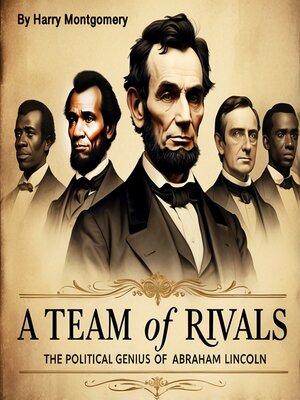A Team of Rivals
audiobook (Unabridged) ∣ The Political Genius of Abraham Lincoln
By Harry Montgomery

Sign up to save your library
With an OverDrive account, you can save your favorite libraries for at-a-glance information about availability. Find out more about OverDrive accounts.
Find this title in Libby, the library reading app by OverDrive.



Search for a digital library with this title
Title found at these libraries:
| Library Name | Distance |
|---|---|
| Loading... |
Abraham Lincoln's early years were marked by hardship, poverty, and a relentless drive to rise above his circumstances. Born in a one-room log cabin in Kentucky in 1809, Lincoln experienced the difficulties of frontier life. His family moved frequently, and his formal education was limited to less than a year's worth of school. Yet, even in these early years, he developed a deep curiosity and love for learning. He read whatever books he could find, often borrowing them from neighbors, and was known to read by firelight late into the night. This hunger for knowledge became a central part of his identity and would later feed into his political ambitions.
Lincoln's entry into politics began in Illinois, where he settled in the town of New Salem. There, he earned a reputation for honesty, storytelling, and a sharp intellect. He first ran for the state legislature in 1832 and lost, but he tried again two years later and won. As a member of the Illinois State Legislature, he began to develop his political skills and established a clear stance on important issues such as internal improvements and economic development. He aligned himself with the Whig Party, inspired by Henry Clay's vision of a strong national economy. During this time, Lincoln also began to study law, teaching himself the subject and eventually becoming a successful lawyer in Springfield, where he built a respectable career and deepened his connections.
Though he was gaining traction in law and state politics, Lincoln's ambition reached further. He served a single term in the U.S. House of Representatives in the late 1840s, during which he opposed the Mexican-American War and supported internal improvements. However, his criticism of the war was unpopular, and after his term, he faded from national politics for a while. Yet, Lincoln was far from finished. The moral and political debate over slavery rekindled his interest in national affairs.







